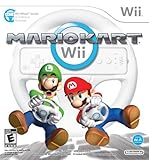 My son likes to challenge me to battles on MarioKart Wii. While the main game is the traditional car race, there are also two options for battles:
My son likes to challenge me to battles on MarioKart Wii. While the main game is the traditional car race, there are also two options for battles:
Balloons: Each player starts with 3 balloons attached to their cars. The goal of the battle is to protect your balloons from being popped while trying to pop as many balloons as possible on the opposing team.
Coins: Each player starts without coins. The goal of the coin battle is to collect as many coins as possible.
It turns out I detest the balloon battle option. I started thinking about why this is the case, and determined it is a matter of personal motivation preference. The goal of gaining points by reducing the other team’s number of balloons does not appeal to me at all. In contrast, seeing the number of coins I’ve collected and making the number go up up up is much more motivating to me.
The same is not true of everyone; my son on the other hand, prefers the balloon battle. He likes to watch the balloons pop.
We can expand the learning outside of MarioKart Wii. Understanding what games someone enjoys can tell you a lot about their motivation preferences. Among my favorites are Trivial Pursuit, Clue, Blokus, Jeopardy, and Who Wants to be a Millionaire. Clearly, if you want to motivate me, find ways to let me show you how smart I am and challenge me with a puzzle to solve. The conclusion might be different for someone who enjoyed playing Scrabble and watching Wheel of Fortune.
Consider the board games, video games, game shows and sports that you like to play and watch. What do they say about your motivation preferences? Do you like to win, or beat your own high score? Do you prefer to play solo, or would you rather play a team sport? Do you like to take risks? Would you rather play for fun or for the challenge of it?
Perhaps organizations should have game closets to assess what types of achievements fuel their employees.
Based on your favorite games, what are your motivation preferences?
